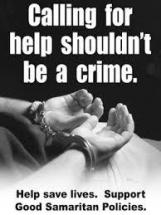Governor Lepage: Kids are Dying on Your Watch - Support the 911 Good Samaritan Law

Harm Reduction
911 Good Samaritan Law
Naloxone
Addiction Advocacy Articles and News
Drug War
Drug Policy Reform
Drug War Articles
Overview
Originally Published: 03/03/2014
Post Date: 03/03/2014
by Tim Cheney | Chooper's Guide
Summary/Abstract
As of January 1, 2014 17 states and D.C. have passed "Good Samaritan" laws that grant limited immunity to drug users who seek help for someone who has overdosed from either a prescription opioid or a Schedule I opioid such as heroin. Each states offer different levels of protection for the person reporting the overdose incident with arrest, charge and prosecution being the primary variables. Delaware, New Jersey and the District of Columbia provide the most protection.
Please support this petition. Addiction is a disease not a crime. Everyone deserves the right to live..
Content
Maine is hopefully moving toward finally passing LD 1686 which allows naloxone to be dispensed to and administered by emergency personnel and private citizen to overdose victims. While this is a critical piece of legislation needed to curb the escalating incidence of opioid overdose mortality in Maine, its potential impact is seriously constrained by the lack of a 911 Good Samaritan Law which is the logical companion to this legislation. Last year the House and the Senate passed this bill and Governor LePage vetoed it. "Governor LePage believes we'll solve the drug problem in Maine through law enforcement and reliance on the judicial system." LePage justified his decision by claiming that he was "concerned this bill may create an unnecessary barrier for drug enforcement when drug use remains a significant scourge in [Maine]." This translates to a low level drug possession or paraphernalia arrest is of more value than a human life. We need your support while the issue of overdose prevention is in on the table in Augusta and the media spotlight.
There are two critical issues:
1. In many instances, private citizens (family, friends or other drug users present), may not be in possession of naloxone at the time of the incident and for drug users to report an overdose, the immunity from arrest, charge and prosecution must be present.
2. Most users and addicts use in groups (85% of documented cases) and Maine is primarily a rural state. It is crucial for a person to stay with the victim until help arrives as they may require hospitalization. Naloxone generally is effective for approximately 30 minutes and leaves the unattended victim at risk of again losing consciousness. It is not unusual for a victim to require a subsequent naloxone administration. The Good Samaritan Law would provide immunity to the individuals to contact professional personnel and would help to insure that the victim was not left unattended until help arrived.





